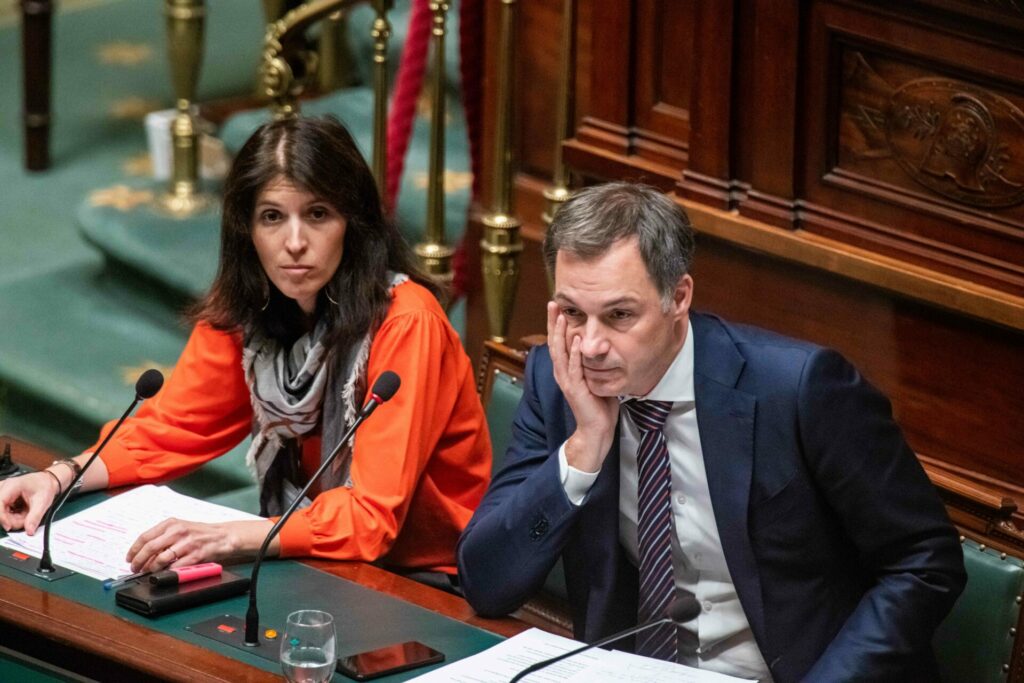As Belgium enters day 164 of its Federal Government formation, any hope of a fast process was quickly dashed in the early stages. And the longer the process takes, the more typically Belgian terms pop up in national newspapers.
From who is leading which party to Bart De Wever's infamous 'supernote' and the King's role in all of this, here is a simple guide to everything you need to know about the government formation process.
Key terms
Arizona: The nickname the Belgian media have given the current envisaged Federal Government composition. It is inspired by the flag of the US state of Arizona, which has all the colours of the parties (blue for liberals MR and centrists Les Engagés, yellow for right-wing N-VA, orange for Christian democrats CD&V and red for socialists Vooruit) in the line-up – in line with a tradition in Belgian politics to use parties' colours to design a ruling coalition.
The previous coalition was known as 'Vivaldi' and received its name because its four components represented the composer's 'Four Seasons': red for socialists PS and Vooruit; blue for liberals MR and Open VLD; green for ecologists Ecolo and Groen; and orange for Christian democrats CD&V.
Formator: The person in charge of forming the government who is appointed by the King. This is usually an experienced politician from the party that won the elections. In this case, N-VA party leader Bart De Wever has been tasked with the role.
While the King is free to choose any formator he wants, his decision is usually informed by his consultations with the party leaders about what kind of government formation would be acceptable.
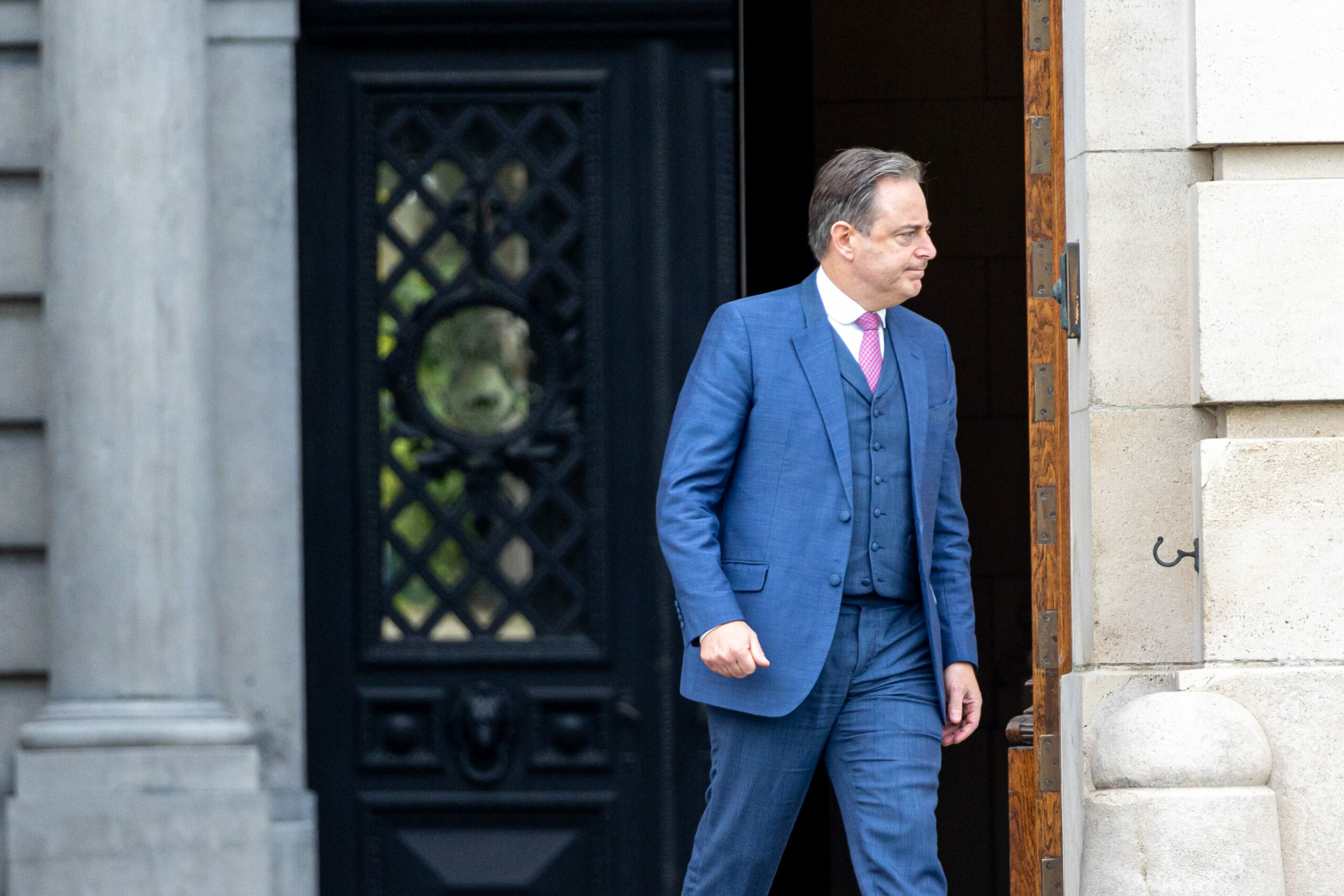
N-VA's Bart De Wever pictured after a meeting at the Royal Palace. Credit: Belga / Dirk Waem
Once the coalition is formed, the formator draws up a government agreement, which will then become the basis of cooperation during the next legislature. The text details the government's priorities and is written in negotiation with all involved parties.
While it is not written in stone, (one of) the person(s) who succeeded in forming a government is usually "rewarded" by becoming Prime Minister of the government they formed.
Supernote: De Wever's much-discussed and revised "socioeconomic supernote" has become a key document in the current formation process, making headlines in the Belgian press.
Before discussing anything else, De Wever first wanted all negotiating parties to agree on this document – which was meant to be the backbone for reforms and savings to put the Belgian budget in order, and tackled reforms on the labour market, pensions and taxation.
The parties did not manage to agree on how these reforms should be implemented. The supernote was therefore revised several times in an attempt to find a compromise, but has now been put on the back-burner while less controversial subjects are discussed.
What is the King's role?
According to Article 96 of the Belgian constitution, the Belgian King must start the formation of the country's Federal Government. He does this first through consultations with party leaders and the resigning Prime Minister, among others, and later through appointing the formator.
The King decides on who becomes formator, and therefore has a certain "power" in steering the negotiations in a certain direction. It is a delicate exercise in diplomacy that can see the King having to act as a "referee" if there are strongly opposing views among the party leaders.
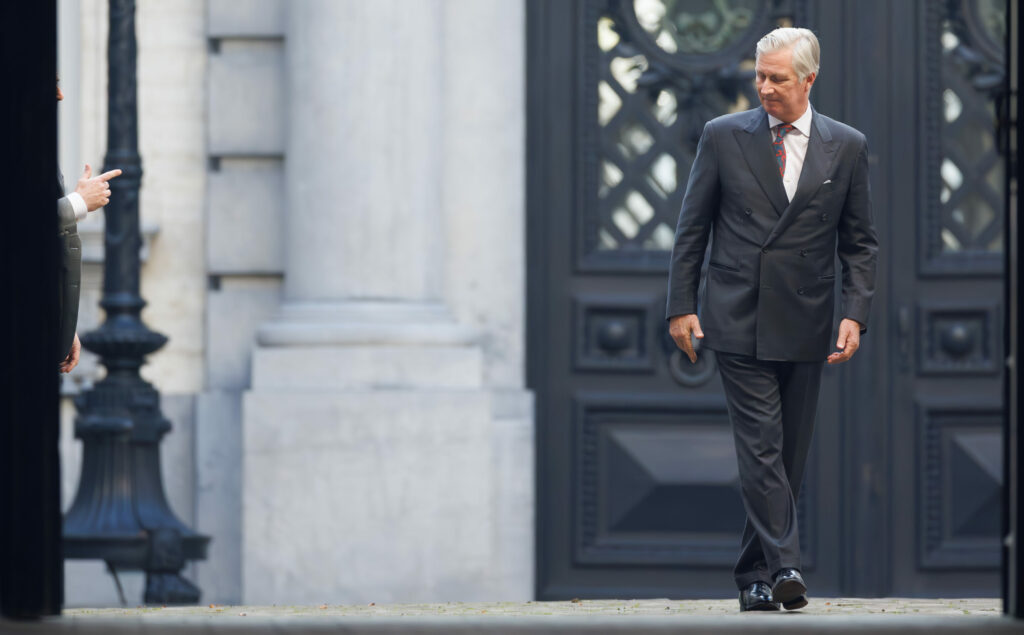
King Philippe. Credit: Belga/Benoit Doppagne
The formator has regular appointments at the Royal Palace, when he reports to the King about any (lack of) progress in forming a majority coalition. During the negotiation progress, the formator is given several deadlines by which time it is assumed some progress will be made.
While the King has no say in what is in the final coalition agreement, all its members must also take the oath before the King once the Federal Government is formed.
World record?
Belgium is currently on day 164 without a Federal Government. While nearly half a year without proper leadership is certainly very long, it does not even come close to previous formations.
The Belgian 2010-2011 formation process broke the world record for the longest time a country has spent without a government: 541 days. In 2020, the country broke its own record as it spent 652 days without a government following the fall of its previous government (led by Charles Michel) in December 2018.
Which parties are involved in the negotiations?
With a total of 150 seats in the Federal Parliament, a coalition must have 76 seats to secure a majority. Together, the parties trying to form the 'Arizona' coalition have a 82-seat majority.
N-VA: Flemish right-wing party, led by Bart De Wever. The party won the 9 June elections, despite many experts predicting the victory would go to far-right Vlaams Belang. With 24 seats, N-VA remains the leading parliamentary group in the Federal Parliament.
MR: Francophone liberal party, led by Georges-Louis Bouchez. The party won big in the Brussels-Capital Region and Wallonia, gaining six seats in the Federal Parliament. With 20 seats, it is the second-biggest party in the Arizona coalition.
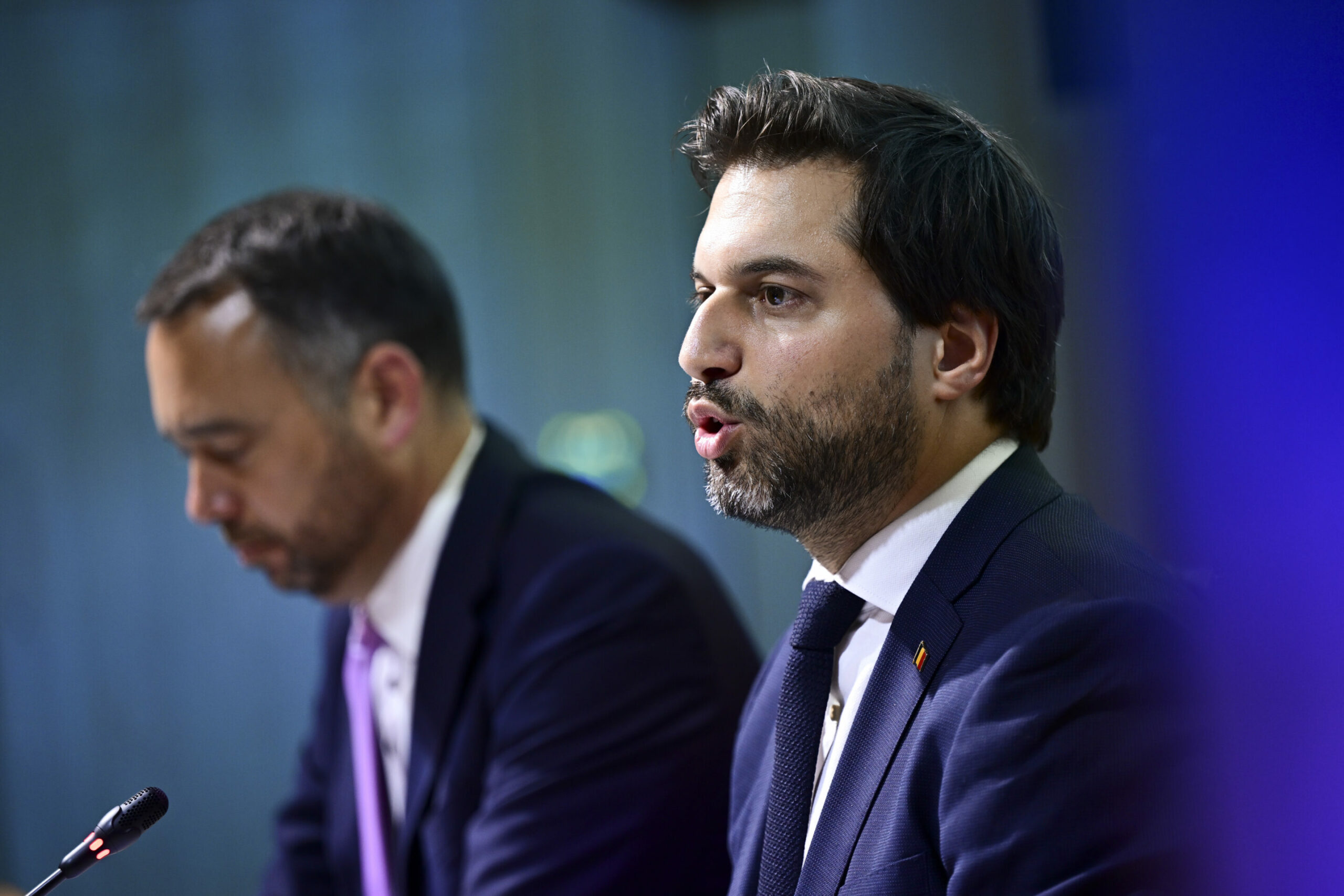
Les Engages' leader Maxime Prevot and MR leader Georges-Louis Bouchez hold a joint press conference on Thursday 11 July 2024. Credit: Belga Laurie Dieffembacq
Les Engagés: Francophone centrist party, led by Maxime Prévot. The party (previously called cdH) registered the most substantial climb after the 9 June elections – gaining nine seats to secure 14 in total.
Vooruit: Flemish socialist party, led by Conner Rousseau. The party gained two seats in the Federal Parliament, moving to a total of 13. Despite several controversies surrounding Rousseau, Vooruit did well in the elections. It is the only left-of-centre party in an otherwise centre-right Federal Government.
CD&V: Flemish Christian democrats, led by Sammy Mahdi. The party lost one seat following the election and now has a total of 11 seats.
Which parties are not?
Vlaams Belang: Flemish far-right party, led by Tom Van Grieken. Despite not winning the elections, the party still gained over 23% of the votes in Flanders – equivalent to 20 seats in the Federal Parliament.
Despite Vlaams Belang becoming the second-biggest party in Belgium, they were not invited to the government negotiations due to the political cordon sanitaire in place in the country. This is an agreement between political parties not to enter into government with the far-right. The rule was introduced in 1989 following the far-right party Vlaams Blok's (Vlaams Belang's predecessor) electoral success in 1982.
PTB-PVDA: radical left Belgian Workers Party, led by Raoul Hedebouw. The party gained three more seats than in 2019, giving them a total of 15 seats in the Federal Parliament.
PS: Francophone socialist party, led by Paul Magnette. While PS lost four seats, the party still ended up as the fourth-biggest party with a total of 16 seats. However, Magnette announced that the party would not enter into the Federal Government as a result of the electoral defeat.
Open VLD: Flemish liberal party, led by Eva De Bleeker. The party of outgoing Prime Minister Alexander De Croo lost big and stranded at seven seats (-5). Former party leader Tom Ongena immediately announced his resignation and said that the party would join the opposition.
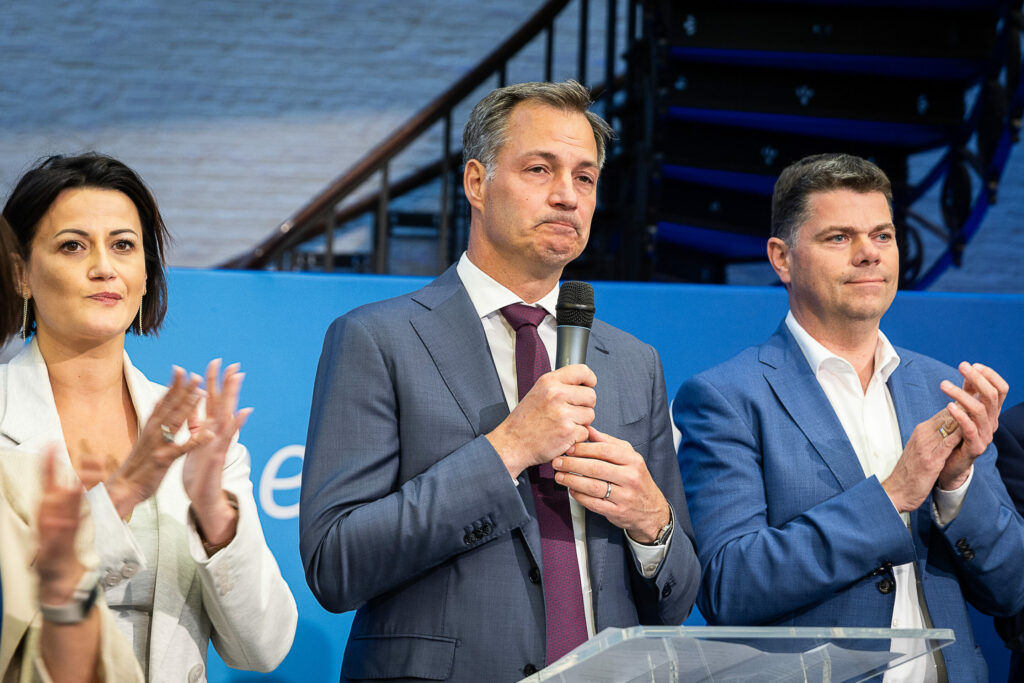
Prime Minister Alexander De Croo gets emotional at Open VLD's post-election meeting. Credit: Belga / James Arthur Gekiere
Groen: Flemish green party, currently without leadership. While the party did very well among Dutch-speaking Brussels residents, it lost substantially at the federal level and only secured six seats (-2). Not long after the elections, its party leaders resigned. The party will elect its new party leader(s) in December.
Ecolo: Francophone green party, led by Samuel Cogolati and Marie Lecocq. The party suffered a major defeat and lost ten seats compared to the previous elections, and was left with only three. Its party leaders resigned, but were replaced shortly after.
DéFI: regionalist party defending French speakers' rights in Brussels, led by Sophie Rohonyi. The party's former leader François De Smet stepped down after its disappointing performance in the elections, shrinking from two seats to one.

